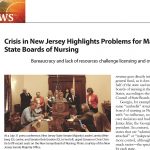New Jersey State Nurses Support Multi-State Nursing Compact
The New Jersey State Nurses Association (NJSNA) is in full support of the multi-state nursing compact, which allows more portability of nurses that will improve access to care for patients.
“New Jersey did not initially go into the compact because the initial compact requirements were not as strict as ours, there were concerns that other states did not have the standards for vetting a nurse that New Jersey has,” said Benjamin Evans, DD, DNP, RN, APN, president NJSNA. “The compact requirements have been elevated to include fingerprinting and background checks that New Jersey requires of its nurses. Now that this has been done, we are in support of it.”
To improve portability and the practice of nursing, New Jersey participating in the compact would allow New Jersey nurses to work in other participating states without applying for a new license or endorsement. This is especially critical in times of crisis.
“Say New Jersey had Hurricane Harvey, we could get any nurse from any compact state to come and help immediately, without the red tape of paperwork,” said Judith Schmidt, CEO of NJSNA. “Nurses could also help in areas where there is a shortage of nurses, such as the Midwest. In a compact state a nurse can go to an area that needs additional nurses within the compact and begin to practice immediately without needing endorsements; the compact eliminates that need.”
There are more than 20 states in the compact, “We have not heard any negative comments from other nursing associations who have nurses practicing in compact states,” said Schmidt.
Nurses who live on the borders would also benefit from New Jersey joining the compact, they would not need to hold two licenses from two states, as they are required to do currently. For example, a nurse who lives in Trenton and wants to work in New Jersey and Philadelphia needs licenses in both New Jersey and Pennsylvania. Under the compact, one license would cover practice in both states.
Delaware and Maryland are compact states, but currently New York and Pennsylvania are not members.
Quality of care across state lines is not expected to be an issue because nursing programs are dually accredited.
“Nursing programs are accredited nationally by the American Association of Colleges of Nursing, National League for Nursing and the individual state Boards of Nursing, so there is very little real concern about the quality of education that nurses have,” said Evans.
The multi-state compact is supported by the National Council of State Boards of Nursing.
See presentation from NJSNA’s 2016 Annual Convention about the multi-state compact.
See New Jersey Assembly bill A3917.
###
About NJSNA
NJSNA, which was established in 1901, is a constituent member of the American Nurses Association. The New Jersey State Nurses Association (NJSNA) represents the interests of 125,000 registered nurses and advanced practice nurses as an advocate for the nursing profession. NJSNA’s lobbying arm continues to protect the nursing profession through legislative victories. Its nonprofit foundation, Institute for Nursing, helps nurses further their careers by providing continuing education, scholarships and research grants in addition to invaluable networking opportunities. For more information, nurses can visit www.njsna.org or contact NJSNA at njsna@njsna.org or (609) 883-5335.





